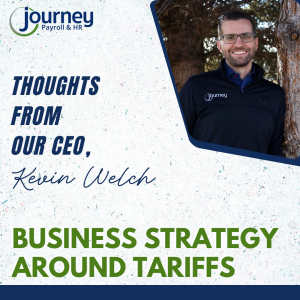Preparing for Changes Due to Tariffs: A Guide for Businesses Navigating New Waters from the impact of Tariffs in 2025 and 2026

As we navigate the complexities of the current economic landscape, it’s crucial for businesses to understand and prepare for the impact of tariffs. My goal is in this write up is to help as many businesses as possible view the reality of what’s going on and succeed to their maximum ability. I believe we can all agree that we don’t have all the answers, and there isn’t one path to success. It’s important to remove emotions or personal opinions about government decisions, stay informed, and continuously be proactive, or at least prepared to react.
Understanding the Impact of Tariffs
Tariffs are taxes imposed on imported goods, designed to protect domestic industries and generate government revenue. However, they also lead to higher costs for businesses that rely on international supply chains. These increased costs are likely to be passed on to consumers, resulting in higher healthcare expenses.
Anticipating Cost Increases
Businesses could expect cost increases in several areas due to tariffs:
- Costs of Goods: Retailers and manufacturers may face higher costs for imported goods and raw materials, which can lead to increased prices for consumers.
- Healthcare Costs: Medical devices and supplies are facing higher prices, which will likely force healthcare costs for both providers and consumers to increase more aggressively.
- Computer Equipment: The tech industry is particularly vulnerable, with tariffs on components and finished products leading to higher prices for computers and related equipment.
- Business Insurance Costs: Tariffs can lead to higher premiums for commercial property, auto, and business interruption insurance due to increased costs for materials and repairs.
Some areas of your business costs will be more protected or have more questions that still need answered. Here are two examples:
Payroll Services: Similar to other business services, payroll services themselves may not be directly impacted by tariffs, though the overall economic pressure could lead to higher operational costs. At Journey Payroll & HR, we are better positioned well, due to our proprietary software and fully domestic service, sales, and software teams. The impact will be more significant for publicly traded companies that hire overseas.
Hiring Costs. Tariffs that lead to higher cost and less consumer spending, prompt businesses to pull back from hiring and potentially resort to layoffs. This could result in increased unemployment rates and a more competitive job market. This creates an opportunity for strong companies that can hire, as the pool of applicants will most likely increase. During harder economic times, salaries typically increase less, so this will unlikely be a direct issue.
Strategies for Businesses to Prepare
To mitigate the impact of tariffs, businesses can adopt several strategies:
- Diversify: Explore alternative suppliers in countries not affected by tariffs. There can and will likely be higher prices, though this can help reduce dependency on high-cost imports and stabilize supply chains, especially if you buy in the USA.
- Increase Efficiency: Invest in automation and process improvements to enhance productivity and reduce operational costs. This can offset some of the financial burden caused by tariffs.
- Adjust Pricing Strategies: Evaluate pricing models to determine if cost increases can be passed on to consumers without significantly affecting demand. Transparent communication about price changes can help maintain customer trust.
- Optimize Inventory Management: Implement robust inventory management practices to avoid shortages and minimize the impact of fluctuating supply chain costs.
- Financial Planning: Develop comprehensive financial plans that account for potential cost increases. This includes budgeting for higher expenses and exploring financing options to maintain cash flow.
Staying Objective and Proactive
It’s crucial for businesses to make strategic decisions based on objective analysis rather than emotions tied to politics or the tariffs themselves. Understanding that the situation is what it is, businesses must navigate these waters with a clear, proactive approach. By focusing on practical solutions and staying adaptable, businesses can position themselves to handle the challenges effectively and emerge stronger.
While tariffs present significant challenges, businesses can take proactive steps to stand out in their industry. By diversifying supply chains, enhancing efficiency, adjusting pricing strategies, optimizing inventory management, and planning financially, businesses can navigate the economic landscape despite the pressures of tariffs.
I always recommend to work with other local businesses, not only because it keeps your money more so in the community you service, but other local businesses have the same perspective. It makes business smoother and more fun when you’re working with people you know ‘get it’.
Let’s Journey Forward!
Kevin